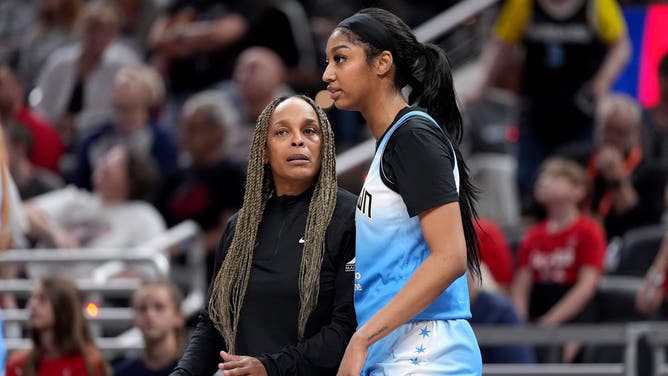Angel Reese Says Media Likes To 'Twist' Her 'Words'
Chicago Sky rookie Angel Reese previously said that she is "fine" with being a "villain." But it doesn't seem that way based on some recent comments made to a reporter for the Chicago Sun-Times.
Steve Greenberg says he pulled Reese aside to talk to her about life outside of basketball, but Reese wasn't interested in speaking to him.
"A few questions in, it was clear that one- or two-word answers were the order of the day. And that something was wrong, even though Reese essentially had ignored a couple of questions by saying, dismissively, ‘I’m good,’" Greenberg wrote.
"I know how y’all like to twist my words, so I’m just keeping it short and sweet," Reese said, according to Greenberg, who then tried to tell her that he wouldn't do that.
"I can’t trust any of y’all, so I’m just letting you know — short and sweet," Reese responded.
![During a recent interview, Chicago Sky rookie Angel Reese told a reporter that the media likes to "twist [her] words."](http://images.outkick.com/static.outkick.com/www.outkick.com/content/uploads/2024/06/668/376/angel-reese-chicago-sky-2-scaled.jpg?ve=1&tl=1)
During a recent interview, Chicago Sky rookie Angel Reese told a reporter that the media likes to "twist [her] words."
(Kamil Krzaczynski/USA TODAY Sports)
There are a few interesting pieces from this reported conversation between Reese and the Chicago writer.
First, when Caitlin Clark didn't give "the right answer" to a reporter about her "white privilege," WNBA player DiJonai Carrington wrote that "silence is privilege."
Clark was later asked the same question, and she changed her answer because of the pressure to do so.
Apparently, Angel Reese has some privilege, then, since she's perfectly fine with not talking to the media.
She did the same thing after the first loss to Clark and the Fever, and the WNBA fined both her and the Chicago Sky for refusing to comply with media availability rules.
Secondly, Reese said she's OK with being the villain. That made perfect sense at the time; being Caitlin Clark's rival is very good for Angel Reese's business.
Springboarding off Clark's fame has vaulted Reese to, arguably, status as the second-most famous women's basketball player in the world.
But if she really wants to be a villain, then she needs to understand what comes with that territory. If she's going to take jabs at Clark in the media and take shots at her on the court, there are going to be repercussions.

Angel Reese has used Caitlin Clark to build her brand, but she might be starting to regret taking that path.
(Getty Images)
Not to mention the fact that in this video-obsessed world, almost everything Reese says is captured on camera.
It's unclear exactly what Reese might be referring to, but after the Sky's last game, Reese made comments about the referees when asked about her flagrant foul on Clark.
Those comments were captured on camera and widely shared. Sure, people might interpret them differently, but it's hard to twist them when everyone hears what she said.
Greenberg then alluded to the idea that Reese is having a bit of a mental health issues dealing with all the criticism that has come with her newfound fame.
The media asked Teresa Weatherspoon, the Chicago Sky head coach, about Reese's mental status.
"I think sometimes we fail to realize what the athlete might think," the coach said. "What is she thinking? How does she feel?
"I think sometimes we just fail to realize that because it’s almost like every time she speaks, there’s something wrong with what she says. There’s something wrong with what she does."

Chicago Sky head coach Teresa Weatherspoon talks with rookie Angel Reese during a game.
(Getty Images)
It's understandable that Reese, who is still very young at just 22 years old, is struggling to cope with the stress that comes from being thrust into the spotlight.
But that thrust into the spotlight has also led her to a lot of money and recognition. She has sponsorship deals, sells merchandise on her own website, and gets to go on stage at rap concerts.
That all comes with being a famous professional athlete, but so does criticism. It's part of the deal. Plenty of male athletes have gone through the same thing, and we shouldn't treat Reese any differently because she's a woman.
That's what equality is all about. Treating WNBA players differently than NBA players would not be equal. But, at times, it feels like that's exactly what the league wants the media, and fans, to do.